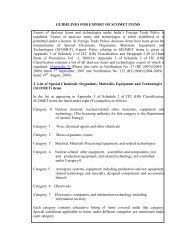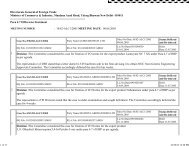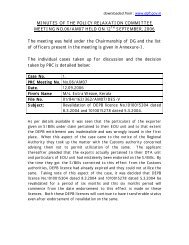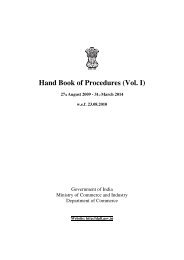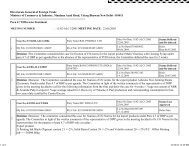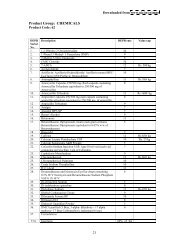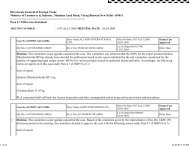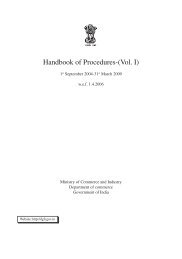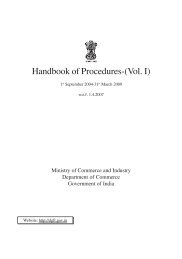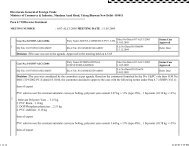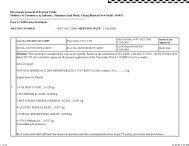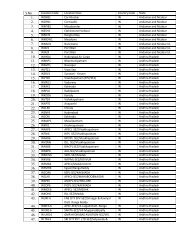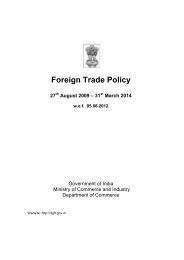Foreign Trade Procedures 2008-2009 - Directorate General of ...
Foreign Trade Procedures 2008-2009 - Directorate General of ...
Foreign Trade Procedures 2008-2009 - Directorate General of ...
You also want an ePaper? Increase the reach of your titles
YUMPU automatically turns print PDFs into web optimized ePapers that Google loves.
Certificate <strong>of</strong> Origin 2.21 Certificate <strong>of</strong> Origin (CoO) is an instrument to establish evidence(CoO)on origin <strong>of</strong> goods imported into any country. There are twocategories <strong>of</strong> CoO viz. (1) Preferential and (2) Non preferential.Preferential 2.21.1 Preferential arrangement / schemes under which India is receivingtariff preferences for its exports are <strong>General</strong>ised System <strong>of</strong>Preferences (GSP), Global System Of <strong>Trade</strong> Preferences (GSTP),SAARC Preferential Trading Agreement (SAPTA), Asia-Pacific<strong>Trade</strong> Agreement (APTA), India–Sri Lanka Free <strong>Trade</strong> Agreement(ISLFTA) and Indo- Thailand Free <strong>Trade</strong> Agreement. Thesearrangements / agreements prescribe Rules <strong>of</strong> Origin which haveto be met for exports to be eligible for tariff preference.Authorised agencies shall provide services relating to issue <strong>of</strong> CoO,including details regarding rules <strong>of</strong> origin, list <strong>of</strong> items covered byan agreement, extent <strong>of</strong> tariff preference, verification andcertification <strong>of</strong> eligibility. Export Inspection Council (EIC) is agencyauthorised to print blank certificates. Authorised agencies maycharge a fee, as approved by DoC, for services rendered.<strong>General</strong>ised System <strong>of</strong> (a) GSP is a non-contractual instrument by which industrializedPreferences (GSP)(developed) countries unilaterally and based on nonreciprocityextend tariff concessions to developingcountries. Following countries extend tariff preferencesunder their GSP Scheme:(i) United States (ii) New (iii) Belarus<strong>of</strong> America, Zealand(iv) European (v) Japan (vi) RussiaUnion(vii) Canada, (viii)Norway (ix) Australia(only to LDCs)(x) Switzerland(xi) BulgariaGSP schemes <strong>of</strong> these countries detail sectors / products andtariff lines under which benefits are available, including conditionsand procedures governing benefits. These schemes are renewedand modified from time to time. Normally Customs <strong>of</strong> GSP <strong>of</strong>feringcountries require information in Form ‘A’ (prescribed for GSPRules Of Origin) duly filled by exporters <strong>of</strong> beneficiary countriesand certified by authorised agencies. List <strong>of</strong> agencies authorisedto issue GSP CoO is given in Appendix-4A.Global System <strong>of</strong> (b) Under agreement establishing GSTP, tariff concessions are<strong>Trade</strong> Preference exchanged among developing countries, who have signed(GSTP)agreement. Presently, 46 countries are members <strong>of</strong> GSTPand India has exchanged tariff concessions with 1221



